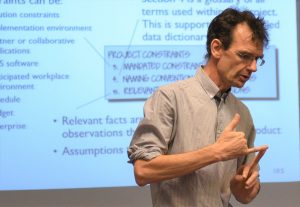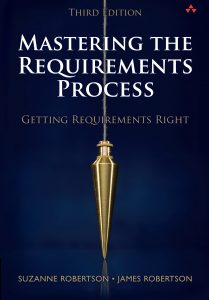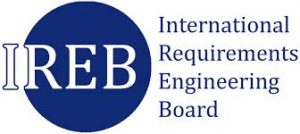Mastering the Requirements Process
Getting Requirements Right | Agile – Traditional – Outsourcing
Requirements. The most crucial part of development. You can overcome poor planning; you can overcome poor coding. But nobody has ever succeeded with poor requirements. Requirements are the underpinnings for whatever you intend to build, whether it be software, hardware, consumer product, service or anything else. Simply put, only the right requirements will get you the right solution.
Requirements discovery is no longer about producing large, unreadable (and often unread) specifications. Requirements today is done in an agile manner, uncovering the real needs of the problem space, understanding the needs of the people who use your solution, and then, in a timely manner, delivering requirements and stories that are concise, clear, testable and correct.
This workshop, presented by a real business analyst, gives you a thorough and well-established process for uncovering the real requirements, testing them for correctness, and ensuring that all the requirements have been discovered. The process is used with variations by both agile and traditional projects. It starts with the business, for it is only within the business that you discover the real needs. When you know the real needs, it becomes possible to determine what will best serve those needs, and to write the requirements or stories to build the right solution.
Learning objectives
You will learn how to:

- Determine the real needs of your stakeholders
- Understand the role of the business analyst in agile projects
- Write agile stories that are more effective and accurate
- Write requirements that are complete, traceable, and testable
- Learn diverse elicitation techniques to uncover the real requirements
- Use the Volere Knowledge Model to ensure you have all the needed information, and nothing that is not needed
- Understand the need for, and how to write, functional and non-functional requirements
- Precisely define the scope of the problem
- Discover all the stakeholders and keep them involved
- Uncover the essence of the business
- Use prototypes, sketches and storyboards to discover hidden needs
- Use state of the art requirements techniques
- Get the requirements quickly, and incrementally
- Write the right requirements and stories.
Is this for me?
Yes, if you want to be involved in delivering the right systems—the ones that get used. Your title is probably business analyst, systems analyst, product owner, project leader or manager, requirements engineer, consultant, product or program manager or similar. Team members on agile projects benefit from understanding how requirements are best done in agile projects. Users, software customers and business stakeholders have found that this course equips them to participate more effectively in the requirements process, and so ensure that the end solution matches what they really need.

You receive a free copy of the third edition of the best-selling book, Mastering the Requirements Process – Getting Requirements Right by James and Suzanne Robertson.
Volere provenance
Volere was introduced in 1995. Since then, the Volere approach to requirements has been used by thousands of projects. These range from the conventional commercial domains such as banking, insurance, and so on, to more exotic areas such as air traffic control, aviation, automotive engineering, real-time control of appliances, telephony, and many more. The techniques were originally developed by James Robertson and Suzanne Robertson. Since their introduction, they have evolved as a result of research and application. James and Suzanne Robertson have continually introduced improvements as their clients have continued to push the requirements envelope. Today, Volere is a trademarked brand owned by the Atlantic Systems Guild. There is a network of consultants, instructors and agents around the world that are available and qualified to help you get better value for your investment in requirements.
James Archer is an associate of the Atlantic Systems Guild. His wide ranging experience, admirable instructing skills and his ability to connect theory to practical examples make him one of the select people qualified to teach the Volere technologies. James’s contribution to Volere is significant. James is a Master of Innovation having graduated with a distinction from the Innovation, Creativity and Leadership Masters from City University in London, which has led to significant participation in the Volere curriculum. Moreover, James is one of the most approachable and knowledgeable people when it comes to discussing your requirements, business analysis and business change needs.
IREB

The Atlantic Systems Guild is a recognised training provider of the International Requirements Engineering Board (IREB) for both the foundation level and the advanced level syllabi.
Please note: the number of attendees is limited. Please register early!
At the top of this page you can download the PDF brochure of this workshop.
James Archer

This event takes place at:
Hotel Lapershoek
Utrechtseweg 16
1213 TS Hilversum
The Netherlands
Telephone +31 (0) 35-6231341
For a full itinerary, please see the website of the Amrath Hotel.
The Hotel Lapershoek can also be reached by public transport. Be sure to take the train to ‘Station Hilversum Sportpark’ from which it is only a three minute walk.
Please consult www.9292.nl (door-to-door journey planner, also available in English) or call 0900-9292 (travel advice by phone, € 0.70 p/m).
For attendees interested in an overnight stay, we have made a special price agreement with the hotel. Please let us know if you wish to make use of this.
testimonials
“Very informative workshop with an excellent and experienced teacher, James Archer.”
In-house Info
Practically all of our seminars and workshops can be offered as an In-house course for your company exclusively. We can tailor with extra focus on specific topics that apply to your organization. Also available in online format or in face-to-face format with live video stream.

